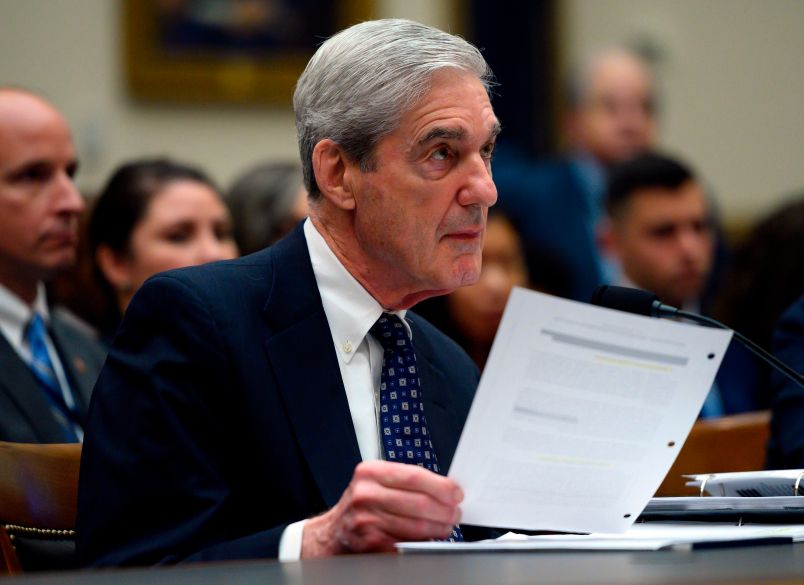The chief judge of D.C.’s federal court ordered the Justice Department on Friday to turn over to the House the portions of the special counsel Robert Mueller’s report that were redacted due to grand jury secrecy as well as those sections’ underlying grand jury transcripts or exhibits.
Chief U.S. District Judge Beryl Howell gave the Justice Department until Oct. 30 to produce the materials to the House Judiciary Committee.
The ruling was a major victory for House Democrats who, until recently, had seen their oversight efforts almost entirely stonewalled by the Trump administration.
When the committee requested to see the report’s grand jury materials, the Justice Department claimed it was legally required to keep the information confidential — but declined to seek a court’s permission to disclose it as is permitted in certain circumstances.
Howell said the the DOJ’s interpretation of the law was “wrong.”
“In carrying out the weighty constitutional duty of determining whether impeachment of the President is warranted, Congress need not redo the nearly two years of effort spent on the Special Counsel’s investigation, nor risk being misled by witnesses, who may have provided information to the grand jury and the Special Counsel that varies from what they tell HJC,” she said.
In court, the House argued that its Mueller-related investigation was part of an impeachment inquiry. That claim came before Speaker Nancy Pelosi publicly sanctioned the current impeachment push that’s focused on the President’s recent dealings with Ukraine.
But Howell’s opinion referenced how the administration has handled the House’s investigation.
“The White House’s stated policy of non-cooperation with the impeachment inquiry weighs heavily in favor of disclosure,” she said alluding to the blanket ban the White House Counsel’s office recently imposed on administration officials participating with the impeachment probe.
She cited the White House Counsel’s letter to argue that claims of accommodation made by DOJ in the case “smack of farce.”
“The reality is that DOJ and the White House have been openly stonewalling the House’s efforts to get information by subpoena and by agreement, and the White House has flatly stated that the Administration will not cooperate with congressional requests for information,” she said.
She also noted that some of the Justice Department’s previous arguments doubting the legitimacy of the impeachment inquiry were now moot with Pelosi’s public embrace of it.
Howell said that the House’s impeachment inquiry clearly fits within the category of “judicial proceedings” within the grand jury secrecy law’s list of reasons that grand jury materials may be disclosed.
The Justice Department had argued that the House’s impeachment inquiry did not in fact satisfy as a “judicial proceeding” — a claim Howell said Friday “raises constitutional concerns. ”
Howell, quoting Mueller’s report, noted that DOJ policy barring indictments of sitting President “prompted the Special Counsel to abstain from ‘mak[ing] a traditional prosecutorial judgment’ or otherwise ‘draw[ing] ultimate conclusions about the President’s conduct.’”
“This leaves the House as the only federal body that can act on allegations of presidential misconduct,” she said. “Yet, under DOJ’s reading of Rule 6(e), the Executive Branch would be empowered to wall off any evidence of presidential misconduct from the House by placing that evidence before a grand jury.”
Howell also dismantled arguments by the Justice Department and the top Judiciary Committee Republican claiming that the impeachment inquiry was illegitimate because it was not opened with a resolution approved by the full house House.
The Justice Department and the Republican Rep. Doug Collins (R-GA) had claimed that the precedent in previous impeachment proceedings was House floor votes on resolutions launching the inquiry. Republicans are continuing to use this talking point to bash the ongoing inquiry.
“Even were this statement accurate, which it is not, the manner in which the House has chosen to conduct impeachment inquiries encompasses more than past Presidents and no sound legal or constitutional reason has been presented to distinguish the House’s exercise of impeachment authority for a President from the exercise of such authority more generally,” Howell said, noting that several impeachment inquiries for judges have been launched without a House vote.
“Even in cases of presidential impeachment, a House resolution has never, in fact, been required to begin an impeachment inquiry,” she said.
Her opinion rattled off several questions left open by Mueller’s investigation that are now up to the House to assess as it considers impeachment.
Grand jury material was redacted in report sections about the “Trump Tower Meeting, Carter Page’s trip to Moscow, Paul Manafort’s sharing of internal polling data with a Russian business associate, and the Seychelles meeting, as well as information about what candidate Trump knew in advance about Wikileaks’ dissemination in July 2016 of stolen emails from democratic political organizations and the Clinton Campaign.”
“In some instances, without access to the redacted material, HJC cannot understand what the Special Counsel already found about key events. For example, what appears to be a citation to grand jury material supports the investigative finding that then candidate Trump asked Manafort for continued updates about WikiLeaks’s plans to release hacked documents,” she said.
Read Howell’s opinion below:










